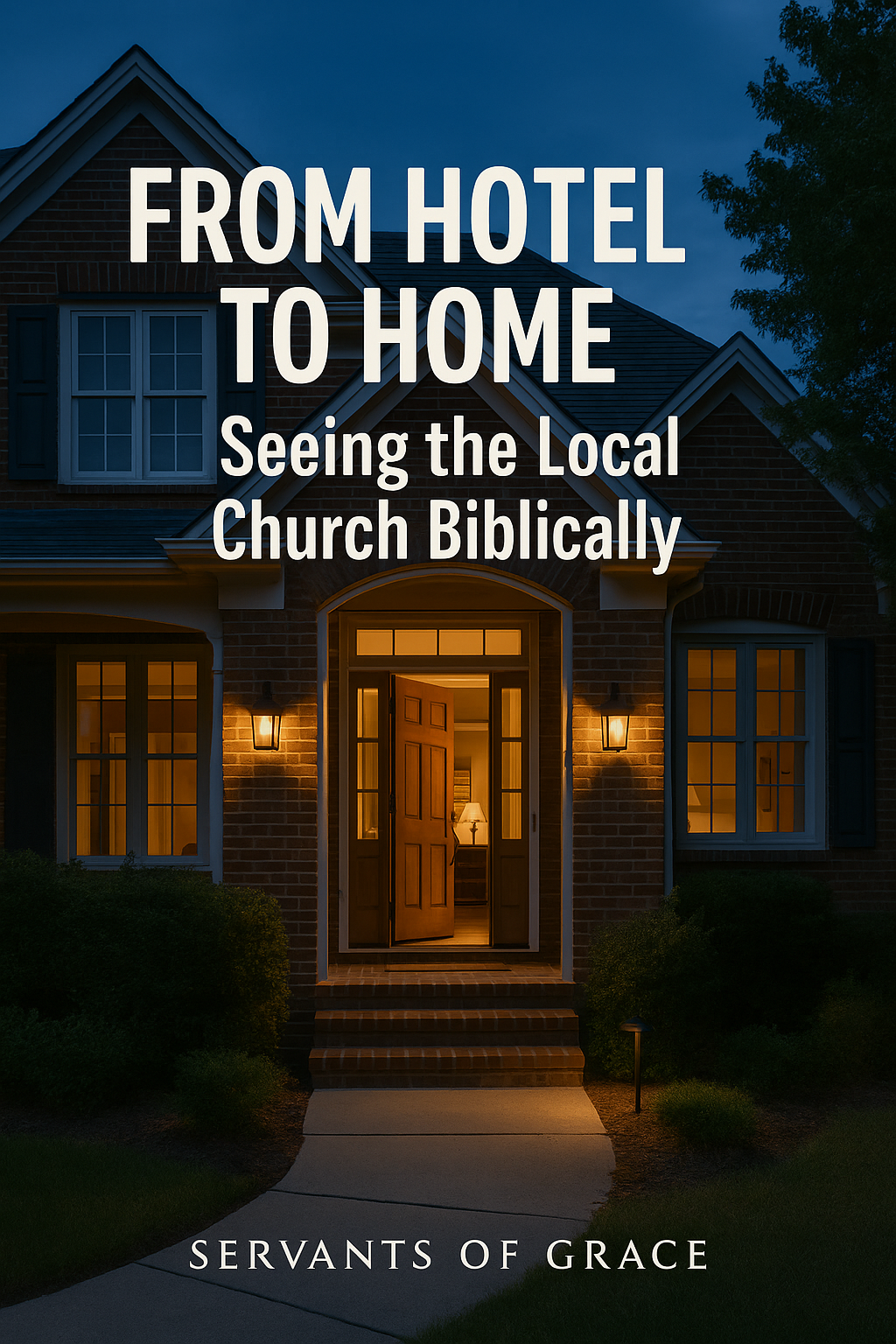⏱️ Estimated Reading Time: 4 min read
From Hotel to Home: Seeing the Local Church Biblically
Series: God’s Design for the Local Church and the Life of the Believer |
Author: David Schrock |
I love the gospel and the church, and I can’t wait to teach them every Sunday. But it wasn’t always that way.
How Do You See the Church?
Admittedly, I was slow to understand and appreciate the importance and beauty of the local church. In high school and college, I came to faith, began sharing the gospel, and learned how the Word of God impacts all of life. In that season, the church was important—but only as an extension of my individual Christianity.
Church was an à la carte affair. I was committed to worshiping on Sunday, but not to any particular church. If I heard the Bible somewhere, that was enough. I was committed to evangelism and discipleship, but I didn’t see them as necessarily connected to the local church. As long as the gospel was going forward, surely that was enough. What did the local church matter?
Near the end of college I “sensed the need” to join a church. I didn’t have biblical reasons—it was just a feeling. After five years of walking with Jesus, I moved across the country to join a Bible-teaching, elder-led church. Still, I thought of church more as a place where individuals attach themselves to one another, rather than a covenant community created by Jesus and bound by His Spirit.
Looking back, I see how much I conceived of Christianity in radically individualistic ways. I believed the gospel, but the operating system of my life was still expressive individualism from my culture. Even after joining a church, I approached it that way—until Scripture corrected me.
The Bible’s Metaphors for the Church
God gives us rich word-pictures for the church: we are God’s household (1 Tim. 3:15), the body of Christ (1 Cor. 12), Christ’s bride (Eph. 5), and God’s temple (1 Cor. 3:16; 6:19; Eph. 2:19–22). Peter adds that we are living stones built into a spiritual house (1 Pet. 2:5, 9). Alongside these biblical metaphors, four practical word-pictures helped reframe my understanding of what the church is—and isn’t.
1) Family Home, Not Spiritual Hotel
The church isn’t an amenity-filled, temporary residence. It’s a long-term, family-filled household where we do life together as brothers and sisters. Our culture trains us to be consumers; God’s Word trains us to be family (John 13:34–35).
- Reflection: Am I living as a brother/sister who commits, serves, and stays—or as a guest who checks in and out?
2) Military Outpost, Not Earthly Resort
There is a place for rest, but the local church is a royal embassy engaged in spiritual warfare (Eph. 6:10–20). We gather not merely to escape the world, but to be equipped to proclaim the gospel of the kingdom together in a hostile world.
- Reflection: Do I see my church as a base for training and mission, or merely as a refuge that caters to me?
3) Heavenly Practice, Not Earthly Pit-Stop
Weekly worship is not just a rest stop on the way to “real life.” It is the practice of our everlasting life (Heb. 10:24–25). Gathering reorders our loves, subverts worldly priorities, and teaches us to store up treasures in heaven.
- Reflection: How does Lord’s Day worship reshape my week—and my picture of eternity?
4) Grace-Filled Shadow, Not Final Substance
Local churches will never be perfect this side of glory. We will feel the thorns and thistles of this age—even in the church (Rom. 8:18–25). Yet Christ uses imperfect congregations as His ordained means for discipleship, worship, and mission until the perfect comes (Matt. 16:18; Eph. 3:10).
- Reflection: Am I patient with the church’s imperfections while longing for the day when all God’s people from every age gather before the throne?
A Gospel-Centered Vision of the Church
These biblical metaphors and practical pictures have enlarged my heart for the church—in all its grace and grit. A gospel-centered church is a beautiful creation of God. If you’ve approached church as a consumer or a drifter, let these images invite you into covenant commitment, sacrificial love, and kingdom mission with Christ’s people.
For more from our series on the Church please here.
David Schrock is the pastor for preaching and theology at Occoquan Bible Church in Woodbridge, Virginia. David is a two-time graduate of The Southern Baptist Theological Seminary. He is a founding faculty member and professor of theology at Indianapolis Theology Seminary. And he is the author of Royal Priesthood and Glory of God along with many journal articles and online essays.




